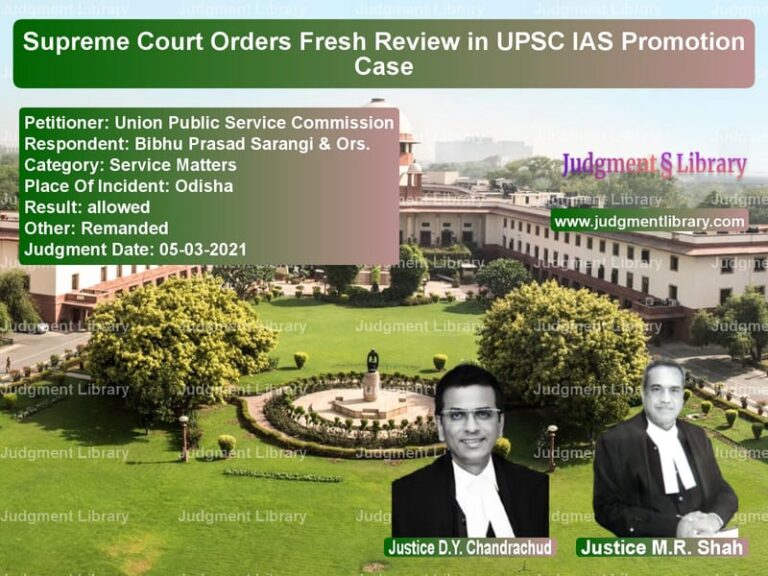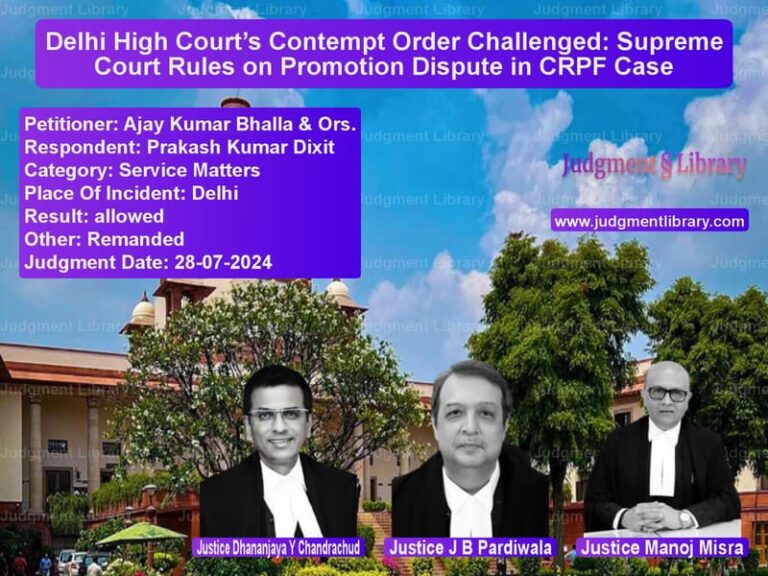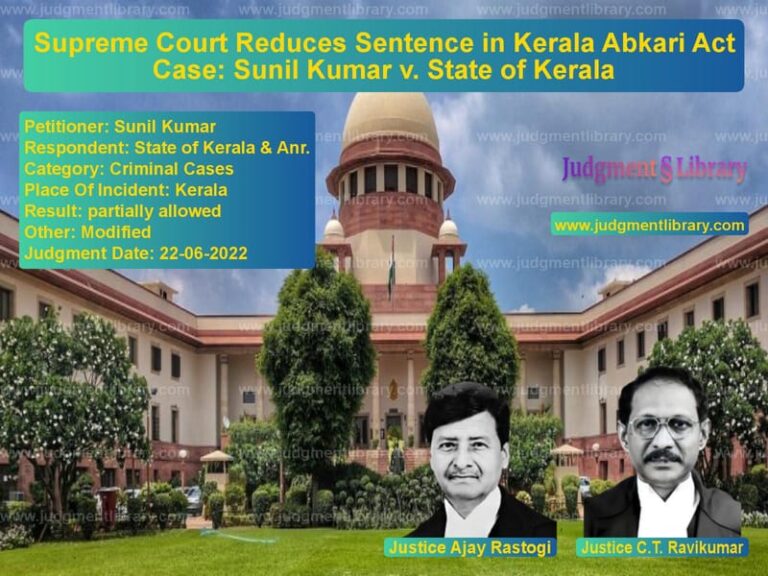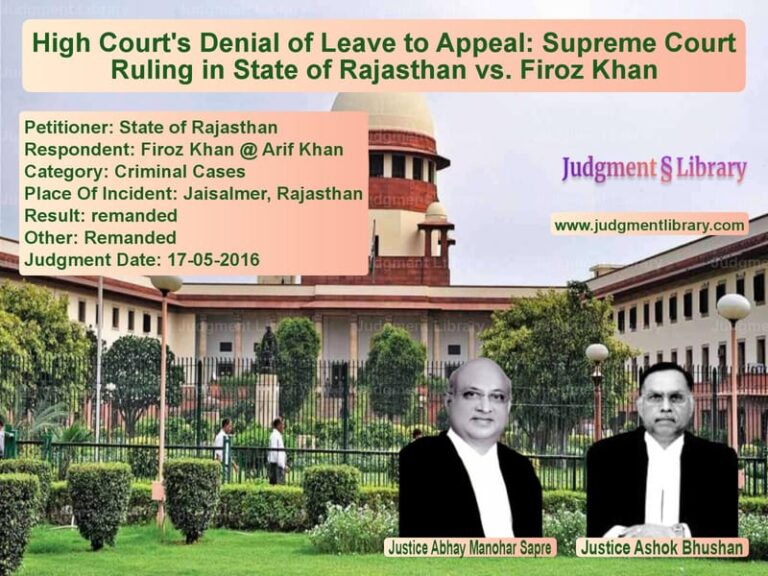Supreme Court Orders Refund of Deposited Amount in Financial Dispute Case
The Supreme Court of India, in the case of Saraswati Singh and Others v. Shailesh Singh and Others, dealt with a financial dispute regarding deposited amounts during the pendency of litigation. The matter revolved around a sum of ₹35 lakhs, of which ₹25 lakhs was withdrawn by the respondents while ₹10 lakhs remained in court deposit. The petitioners sought a refund of the total amount along with the return of title deeds submitted as security.
The judgment was delivered by a bench comprising Dipak Misra, A.M. Khanwilkar, and D.Y. Chandrachud. The court ruled in favor of the petitioners, ordering the respondents to refund ₹25 lakhs and directing the court registry to return ₹10 lakhs along with accrued interest.
Background of the Case
The dispute began when the petitioners filed a writ petition (Criminal) No. 105 of 2016, contesting financial claims made by the respondents. During the proceedings, the court directed the petitioners to deposit a certain amount to demonstrate their bona fides.
Key developments in the case:
- February 20, 2017: The Supreme Court ordered the petitioners to deposit ₹50 lakhs, of which ₹25 lakhs was allowed to be withdrawn by the respondents without security, while the remaining ₹25 lakhs was placed in a fixed deposit.
- April 10, 2017: The order was modified, reducing the required deposit to ₹35 lakhs. The petitioners submitted title deeds as security.
- April 18, 2017: The court granted an extension for depositing the remaining amount.
- May 4, 2017: Parties were advised to seek mediation, but the settlement attempt failed.
- October 30, 2017: The fixed deposit was renewed for six months.
- March 6, 2018: The writ petition was dismissed.
Arguments Presented
Petitioners’ Arguments
The petitioners sought the return of their deposit and title deeds, arguing:
- Since the writ petition had been dismissed, the deposited amount should be refunded.
- The sum of ₹35 lakhs was meant only as a temporary measure to establish their bona fides.
- The respondents should not retain ₹25 lakhs that was withdrawn under an interim arrangement.
- The title deeds, submitted in compliance with court orders, should be returned as they no longer served any legal purpose.
Respondents’ Arguments
The respondents countered:
- The withdrawal of ₹25 lakhs was made in accordance with a court order, and they were not obligated to return it.
- The petitioners voluntarily deposited the amount, and its refund should not be automatic.
- There were financial claims between the parties that justified the retention of the amount.
Supreme Court’s Observations
The Supreme Court noted that the ₹35 lakhs was deposited merely to test the bona fides of the petitioners, not as a settlement amount. The court ruled:
“The aforesaid amounts were directed to be deposited by this Court in order to test the bona fides of the petitioners. Now that the writ petition has been dismissed, we find merit in the application of the petitioners, that they are entitled to a refund of the amount of ₹35 lakhs and the return of the title deeds deposited in this Court.”
Final Judgment
The Supreme Court issued the following orders:
- The court registry was directed to return the ₹10 lakhs still in deposit, along with accrued interest, to the petitioners.
- The respondents were ordered to refund the ₹25 lakhs they had withdrawn within three weeks.
- The title deeds deposited in the court registry were to be returned to the petitioners.
Implications of the Judgment
- This ruling reinforces that deposits made in compliance with court orders for assessing bona fides do not constitute final settlements.
- It clarifies that amounts withdrawn under interim relief orders must be returned when the case is dismissed.
- The judgment ensures that title deeds submitted as security should be returned when their legal purpose is no longer valid.
- The decision protects petitioners from financial losses due to prolonged litigation and ensures that financial transactions ordered by the court remain fair.
This ruling highlights the Supreme Court’s approach in ensuring fair restitution in financial disputes and maintaining the balance of equity between litigating parties.
Petitioner Name: Saraswati Singh and Others.Respondent Name: Shailesh Singh and Others.Judgment By: Justice Dipak Misra, Justice A.M. Khanwilkar, Justice D.Y. Chandrachud.Place Of Incident: India.Judgment Date: 10-04-2018.
Don’t miss out on the full details! Download the complete judgment in PDF format below and gain valuable insights instantly!
Download Judgment: Saraswati Singh and vs Shailesh Singh and O Supreme Court of India Judgment Dated 10-04-2018.pdf
Direct Downlaod Judgment: Direct downlaod this Judgment
See all petitions in Damages and Compensation
See all petitions in Property Disputes
See all petitions in Judgment by Dipak Misra
See all petitions in Judgment by A M Khanwilkar
See all petitions in Judgment by Dhananjaya Y Chandrachud
See all petitions in allowed
See all petitions in settled
See all petitions in supreme court of India judgments April 2018
See all petitions in 2018 judgments
See all posts in Civil Cases Category
See all allowed petitions in Civil Cases Category
See all Dismissed petitions in Civil Cases Category
See all partially allowed petitions in Civil Cases Category







